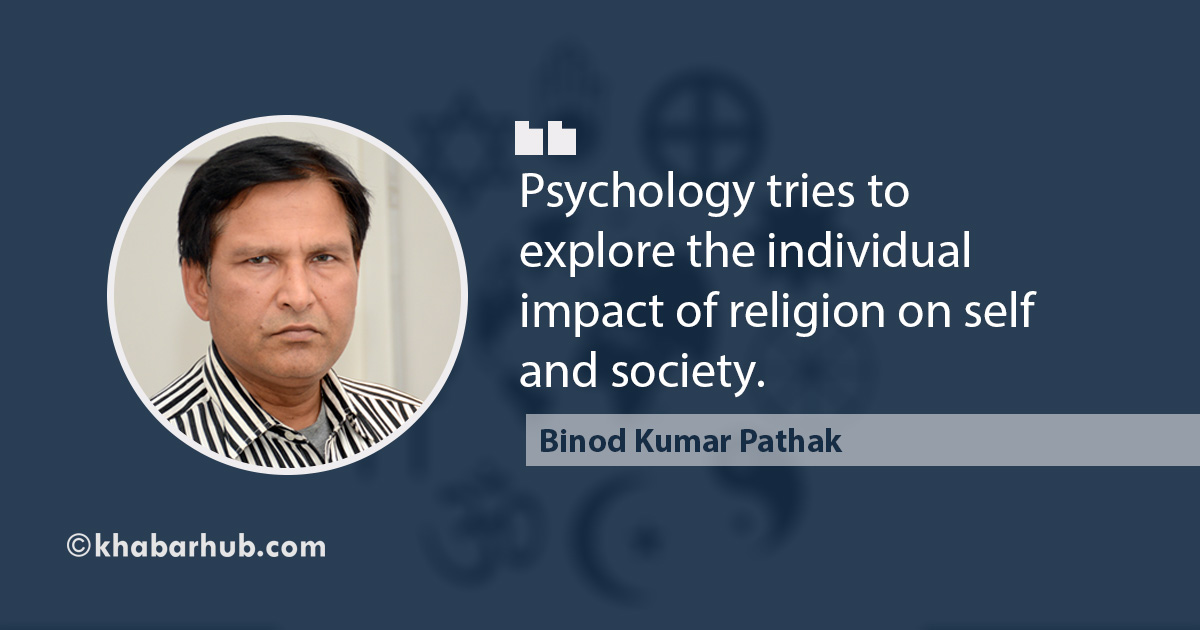Religion for a vast majority of the people provides context and meaning to various things which are happening to (and around) them. They may be guided by some kind of belief system, their own experience of life or they may just be exploratory with open mind accepting or rejecting things happening to (and around) them.
In this way, religion is deeply braided with the culture supported by scores of rituals expressed through ‘Does and Don’ts’ which acts as the basis for personal decision making, social networking, community behavior, family ethics, and worldview.
Psychology tries to explore the individual impact of religion on self and society. Can rationality be the only parameter to measure up incomprehensible realms of religion?
Anthropologists and sociologists explore religion’s effects on individual behavior, family, community, society and social order. Psychologists too jump into the space of religion having unending and unlimited periphery only to come out with contradictory and divergent findings with regard to why humans behave the way they behave and why humans make a choice that they have chosen to make.
Psychology tries to explore the individual impact of religion on self and society. Can rationality be the only parameter to measure up incomprehensible realms of religion? Is religion the root of everything that makes sense or just turns out to be nonsense?
Is there any ground to judge how religion is acting for or against humans in their personal or societal interest? Or, if growth and expansion in human heart, intellect and overall wellbeing in his/her social sphere is taking place, then it is the religion. No matter, one can name it Hinduism, Buddhism, Islam, Christianity or anything as some are naming religion as per their convenience.
The base is that first, the force of emotions and spiritual energy must align individual intellect (mind), emotion (heart) and body into never-to-end harmony to see all others as part of one being. This is called Yoga – in Sanatan Dharma timeless religion often referred to as Hinduism by westerners.
Therefore, Yoga is science and art both. One who perfects or attempts to perfect this art of achieving this never-to-end harmony at an individual level is called Yogis in the eastern tradition. Jalāl ad-Dīn Muhammad Rūmī, more popularly known as simply Rumi, a 13th-century Persian poet, and Sufi mystic said, ”I belong to no religion. My religion is love. Every heart is my temple.”
How can God side with those who cast evil and suffering on others? Is God sadist to see all of us suffering?
Unlike pure sciences, the term religion is difficult to define. For scholars and theologians, religion is a handy tool of playing with words to construct philosophy for interpretation, deliberation, debate, and discussion. It is just an exercise in intellectual itching.
For people dominated by heart, religion becomes the tool of spreading the spirit of both harmony if understood properly and disharmony if misunderstood to claim oneself is the only true religion and chosen devotee of GOD. Next comes the people who cannot live without acts and actions both at thought level and hand-foot level.
For them, religion is seen through what they do and think vis-à-vis what others think and do. Things are not that easy to define religion in a few words and a few sentences. Is God necessary for a religion to exist? Are those who do not believe in God not religious?
After all, there are various religions in the world who do not have any God. Buddhism and Jainism are examples of God-less religion. After all, there are atheists who are always haunted by regret because they don’t believe in God.
Are not they better than those who commit all kinds of crimes by using force such as calling others infidels (heretics or kaphir) and killing them, sacrificing animals and humans in the name of God and destroying modern civilizations to establish the regime dictated by God? How can God side with those who cast evil and suffering on others? Is God sadist to see all of us suffering?
There are brave atheist thinkers who do not feel that non-existence of God is a cause of regret or a matter of great concern rather it is an occasion of rejoicing. The 19th-century philosopher Friedrich Nietzsche who declared the famous phrase ”God is dead” in his book ‘Thus Spoke Zarathustra’, favors free-thinking over dogma or self-constructed theology, exploration over interpretation, freedom over slavery. Nietzsche used the phrase in a figurative sense, not in a literal sense.
Does it mean that if God dies then all that is related to morality, ethics and aesthetics of the world and human civilizations die? If God does not exist, life has no meaning. Does it further mean that a human being cannot give meaning to his or her life and requires somebody outside to control him or her as unlimited freedom in the absence of God is so fearsome?
There are two ways to look at this proposition. First, humans are nasty, brutish and wild. Therefore, they will wander in all directions only to meet their doom by mutually destroying themselves and engaging into baser, immoral and passionate life patterns to get eliminated in the process.
Second, God is a human construct and therefore, human beings have all the power and capacity to not only transform his/her own life but also contribute to transform other’s life too. All the ethics, morality and governing principles flow directly from a human’s mind and heart. It means that absence of God makes the humans their own arbiter of their destiny.
(To be continued…)
Views expressed in this article are the author’s own and do not necessarily reflect the stance of Khabarhub.









Comment